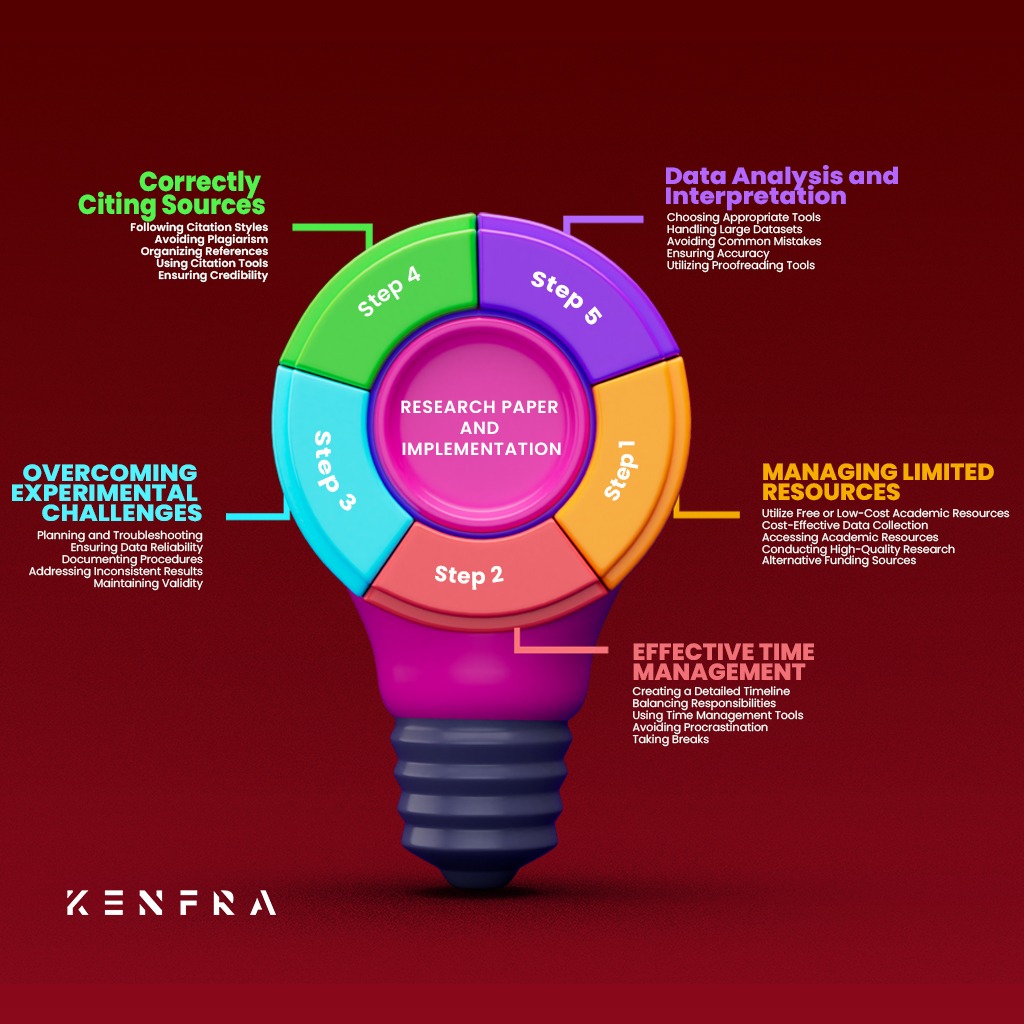Common Challenges in Research Article Writing and Implementation
Kenfra2025-09-26T15:56:59+05:30Research article writing and implementation can be daunting, especially when faced with various challenges. From limited resources to proper citation, each step requires careful consideration. At Kenfra Research, we understand these difficulties and provide comprehensive support to help researchers overcome them. Below, we address some high-volume questions related to common issues in research article writing and implementation.
Research Article Writing and Implementation
Discover practical solutions to common challenges in research article writing and Implementation. such as limited resources, time management, experimental hurdles, and data analysis at Kenfra Research. Optimize your research process with our comprehensive support and expert guidance.
Limited Resources :
How can I write a research article with limited resources?
Writing a research article with limited resources is challenging but possible. Utilize free or low-cost academic resources, online libraries, and open-access journals. Collaborate with other researchers and institutions to share resources.
What are some cost-effective methods for gathering data for my research paper?
Consider online surveys, public data sets, and digital tools for data collection. Fieldwork and experiments can be conducted on a smaller scale to reduce costs.
How do I access free or low-cost academic resources for my research?
Use platforms like Google Scholar, PubMed, and institutional repositories. Many universities offer free access to their libraries and databases for students and researchers.
Can I conduct high-quality research without expensive equipment or software?
Yes, focus on research design and methodology. Use open-source software for data analysis and leverage partnerships with institutions that have the necessary equipment.
What are alternative resources to consider when funding is limited?
Look for grants, crowdfunding, and partnerships with NGOs or industry stakeholders. Apply for research scholarships and seek institutional support.
Time Management
How can I effectively manage my time while writing a research article?
Create a detailed project timeline with specific milestones. Prioritize tasks, set realistic deadlines, and use time management tools like Trello or Asana.
What are some tips for balancing research article writing with other responsibilities?
Delegate non-essential tasks, create a balanced schedule, and allocate specific times for writing. Take regular breaks to avoid burnout.
How do I create a realistic timeline for completing my research paper?
Break down the research process into smaller tasks. Estimate the time required for each task and add buffer time for unexpected delays.
What tools can help with time management for researchers?
Use tools like Toggl for time tracking, Evernote for note-taking, and Google Calendar for scheduling. These tools help keep your research organized and on track.
How do I avoid procrastination while working on my research article?
Set short-term goals, work in focused intervals (Pomodoro technique), and eliminate distractions. Reward yourself for completing tasks to stay motivated.
Experimental Challenges
What are common experimental challenges faced in research article writing?
Researchers often face issues like inconsistent results, equipment malfunctions, and sample contamination. Proper planning and troubleshooting are essential.
How can I overcome unexpected experimental issues during my research?
Document all procedures meticulously, repeat experiments to confirm results, and consult with peers or mentors for guidance.
What should I do if my experimental results are inconsistent?
Review your methodology, check for errors in data collection, and consider external variables that might affect the results. Repeat the experiment if necessary.
How can I ensure the reliability and validity of my experimental data?
Use standardized protocols, calibrate equipment regularly, and conduct pilot studies. Peer review and replication studies can also enhance reliability.
What are best practices for documenting experimental procedures?
Keep detailed records of all steps, including materials, methods, and observations. Use lab notebooks, digital logs, and photographs to ensure accuracy.
Data Analysis and Interpretation
How do I analyze data effectively for my research article?
Choose appropriate statistical tools and software for your data type. Understand the assumptions of each method and ensure your data meets these criteria.
What statistical tools are best for interpreting research data?
Common tools include SPSS, R, Python, and Excel. Select the tool based on your research needs and proficiency level.
How do I handle large datasets in my research?
Use data management software like SQL, Python, or R for handling large datasets. Break the data into manageable chunks and perform analysis incrementally.
What are common mistakes to avoid during data analysis?
Avoid data dredging, ensure proper sampling, and verify data accuracy. Misinterpreting statistical significance and overfitting models are common pitfalls.
How can I ensure my data interpretation is accurate and unbiased?
Use blind analysis techniques, validate results with multiple methods, and consult with colleagues. Peer review can also help identify potential biases.
Not Citing Sources Correctly
What are the best practices for citing sources in a research article?
Follow the specific citation style required by your target journal (e.g., APA, MLA, Chicago). Include all necessary information and double-check for accuracy.
How do I avoid plagiarism when writing my research paper?
Paraphrase information, use quotes sparingly, and always provide proper attribution. Use plagiarism detection software to check your work.
What citation styles are commonly used in academic writing?
APA, MLA, Chicago, and Harvard are the most common citation styles. Each has specific rules for formatting in-text citations and reference lists.
How can I organize my references efficiently?
Use reference management tools like EndNote, Zotero, or Mendeley. These tools help keep your citations organized and correctly formatted.
What tools can help with correct citation and referencing?
Reference management software and citation generators (e.g., Citation Machine) can automate and streamline the citation process.
Not Proofreading Your Paper Carefully
Why is proofreading important in research article writing?
Proofreading ensures clarity, accuracy, and professionalism. It helps catch errors that could undermine your research’s credibility.
How can I effectively proofread my research paper?
Read your paper multiple times, use grammar and spell-check tools, and consider peer reviews. Take breaks between writing and proofreading to see the content with fresh eyes.
What are common errors to look for when proofreading a research article?
Check for grammatical errors, spelling mistakes, formatting issues, and citation inaccuracies. Ensure consistency in terminology and style.
Should I hire a professional proofreader for my research paper?
If budget allows, hiring a professional can enhance your paper’s quality. Alternatively, seek help from peers or mentors.
What tools can assist with proofreading and editing my research article?
Grammarly, Hemingway Editor, and Microsoft Word’s built-in tools are useful for proofreading. These tools highlight errors and suggest corrections.
Finding Evidence to Support Data
How do I find credible evidence to support my research data?
Use academic databases like PubMed, JSTOR, and Google Scholar. Ensure sources are peer-reviewed and relevant to your research question.
What are the best databases for academic research?
Top databases include PubMed for medical research, IEEE Xplore for engineering, and JSTOR for humanities. Access these through institutional subscriptions if available.
How can I ensure the sources I use are reliable and relevant?
Verify the authors’ credentials, publication date, and journal reputation. Cross-check information with multiple sources.
What methods can I use to gather supporting evidence for my research?
Conduct literature reviews, interviews, surveys, and experiments. Use diverse methods to triangulate your findings.
How do I integrate evidence effectively into my research article?
Synthesize evidence logically, relate it to your hypothesis, and discuss its implications. Use proper citation to support your arguments.
By addressing these common challenges, Kenfra Research aims to support researchers in producing high-quality, impactful research articles. For further assistance, explore our comprehensive research support services.










Leave a Reply